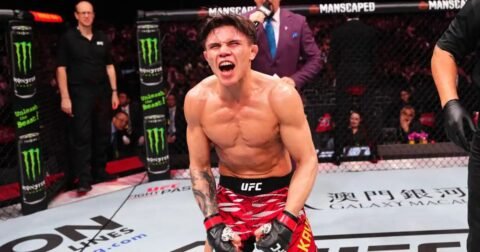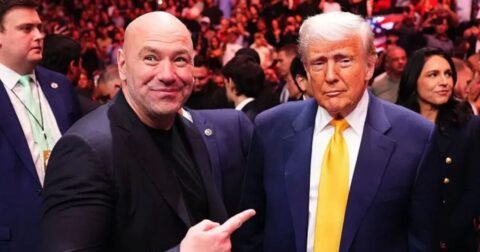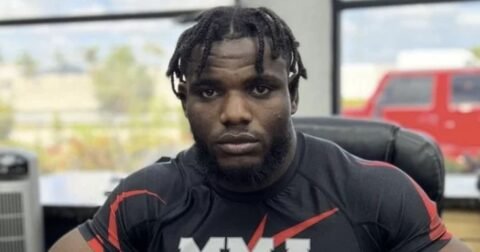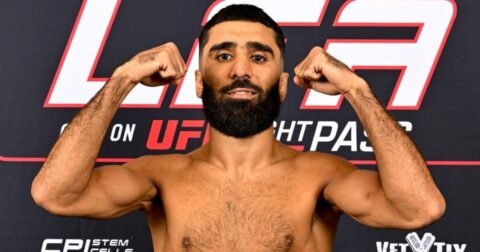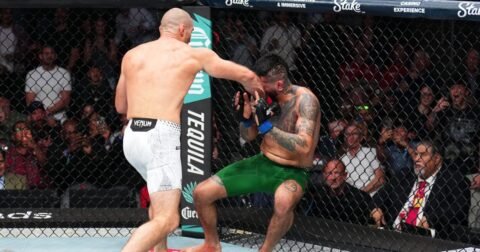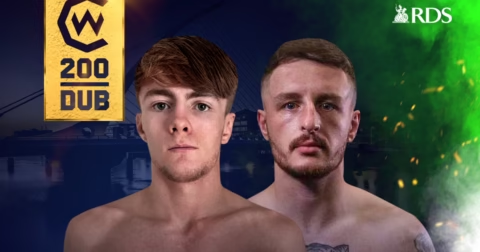Colby Covington’s UFC drama has taken another wild turn as the former interim welterweight champion faces mounting pressure after two consecutive losses, including a recent defeat against Joaquin Buckley. Known for his outspoken nature and fiery rivalry with commentators, Covington has now set his sights on UFC analyst Paul Felder, whom he accused of spreading false narratives about him. This latest controversy has sparked significant interest within the MMA community, further fueling Colby Covington news and updates. Fans and commentators alike are eager for Covington’s next fight analysis, particularly after he challenged Felder to a face-to-face confrontation to settle their differences. With UFC 2025 updates on the horizon, all eyes are on Covington as he navigates the complex landscape of MMA criticism and personal accolades.
The ongoing saga surrounding Colby Covington and his relationships with various figures in the UFC reflects a broader pattern of conflict and rivalry within the sport. This latest feud not only highlights the tensions between fighters and commentators but also raises questions about the integrity of fight analysis in light of personal grievances. Covington’s barbs toward Paul Felder, mixed with his own recent performance struggles, showcase a dramatic backdrop that fans are all too familiar with in mixed martial arts. As the former welterweight title challenger calls for clarity on his next steps in the octagon, the anticipation builds for thrilling matchups and engaging storylines, reminiscent of the ongoing WWE-style entertainment that UFC has become known for. Engaging discussions are sure to continue as more details emerge regarding Covington’s potential clashes and the intricacies of his interactions with the commentary team.
Colby Covington’s Heated Exchange with UFC Commentators
Colby Covington is no stranger to drama within the UFC, particularly when it comes to his interactions with commentators. His latest tirade against UFC commentator Paul Felder has raised eyebrows throughout the combat sports community. In an outburst that seems more reflective of his persona than the sport itself, Covington threatened physical retribution against Felder for what he perceives as unfair criticism. The battle between fighters and commentators has been a recurring theme in the UFC, with Covington often leading the charge when he believes his name is being dragged through the mud. This ongoing feud serves to not only highlight Covington’s combative nature but also raises questions about the responsibilities of commentators in discussing fighters honestly versus sensationally at their expense.
As Covington continues to navigate his tumultuous career, the consequences of his threats and exchanges can be severe, potentially impacting his reputation and public image. The media attention drawn to his comments on Felder illustrates the fine line fighters walk between self-promotion and alienation, particularly in instances where emotions run high. With Covington’s recent losses fueling a perception that his previous bravado may be waning, the UFC community waits to see how this drama unfolds and whether it will lead to further conflict or productive discourse.
The rise of social media has amplified such conflicts, giving fighters like Colby Covington a platform to voice their grievances instantly and publicly. In doing so, they engage fans, stimulate debates, and sometimes, create larger-than-life narratives around themselves—something Covington has mastered. However, the line between entertainment and genuine animosity can often blur, leading to a mixture of admiration and disdain from the audience. Commentators like Felder play a crucial role in shaping perceptions, and their critiques can resonate significantly, depending on their standing within the industry.
This ongoing tension highlights the evolution of the sport and the relationships within it. Fighters are not merely athletes anymore; they are personalities who understand the importance of narrative in building their brands and catering to their fan bases. How figures like Covington adapt to the criticism from commentators will largely determine their longevity and relevance in this competitive landscape.
Analyzing Colby Covington’s Fighting Career and Future
Colby Covington’s career trajectory has been a rollercoaster, punctuated by highs of championship contention and the lows of recent defeats. His recent loss to Joaquin Buckley via doctor stoppage puts him at a critical juncture in his career. As he contemplates his next fight, his comments about UFC commentators, especially Paul Felder, reflect a fighter desperate to reclaim his narrative amid declining fortunes. Covington’s tendency to blame external figures—like commentators—for his struggles shows a lack of accountability that many fans and analysts are starting to notice. With mounting pressure to perform, the question arises: who will Covington face in his next bout, and will he shift his strategy in the octagon to reflect this need for redemption?
Moreover, his potential matchups suggest a willingness to remain competitive in an ever-evolving UFC landscape. Fighters such as Michael ‘Venom’ Page or even a move to middleweight demonstrate Covington’s ambition to remain in the limelight despite recent setbacks. However, how these matchups pan out could heavily depend on the adjustments Covington makes in response to his most recent criticisms—both from commentators and within the sport itself.
As the UFC continues its trajectory toward new heights, every fighter, including Covington, must adapt to survive and thrive. The pressure to win is compounded by the necessity of maintaining a marketable persona, something Covington has built through controversy. His ongoing feud with commentators like Felder not only drives narratives but may also serve as a motivating factor for him in the octagon. If he manages to channel this anger effectively, he could very well surprise skeptics and redefine his position in the sport. Patterns of success in UFC often show that those who can handle the mental game, alongside the physical challenges, emerge victorious.
With UFC 2025 updates pending and fans eager for Covington’s next move, many eyes will be watching to see if he can transform this tumultuous drama into renewed vigor in his fighting technique. Ultimately, the fight’s outcome may be influenced not just by his skills but also by how well he handles the external pressures surrounding him from the media and his opponents.
The Role of Commentary in the UFC: A Double-Edged Sword
The role of commentary within UFC events has always been a contentious topic, often causing friction between fighters and commentators. Figures like Colby Covington have been vocal about their disdain for biased or harsh commentary, particularly when it targets their abilities and career. For Covington, the recent incidents surrounding Paul Felder underscore the unique dynamic between fighters and the people who describe their performances to the public. When commentary goes beyond analysis into personal attacks, it can lead to calls for accountability and even threats of confrontation, as seen with Covington’s remarks.
Commentators carry the responsibility of influencing public opinion and shaping narratives about fighters. Their biases can have a direct effect on a fighter’s perception, creating champions or scapegoats based on how well they narrate the fight’s unfolding story. As such, fighters like Covington urge for a more balanced and respectful approach, advocating for a commentary style that appreciates the sport’s competitive nature without personal vendettas. This demand for integrity in commentary not only protects fighters but also upholds the sport’s reputation as a whole.
On the flip side, the dramatic exchanges between fighters and commentators, such as those involving Covington and Felder, can inadvertently bolster the UFC’s appeal. Boxing, wrestling, and mixed martial arts thrive on narratives that grip audiences, and each conflicting voice adds another layer of intrigue. The blend of sports commentary with real-life drama captivates fans, driving viewership and engagement, which the UFC capitalizes on for higher revenues. It’s a ceaseless cycle of mutual dependence: fighters need commentators to amplify their narratives while commentators rely on the spectacle of drama for content.
Ultimately, balanced and respectful commentary should foster an environment that enhances fight performance and development without crossing the line into personal attacks. Colby Covington’s outburst serves as a reminder that while commentary is crucial in shaping perceptions, it must be delivered with consideration—after all, within the octagon, respect is as valuable as skill.
Future Challenges and Opportunities for Covington
In light of recent defeats, Colby Covington faces defining challenges as he looks to reinvigorate his career. His remarks about Paul Felder serve as a distraction but also highlight his awareness of the competitive landscape surrounding him. Covington must not only respond to his criticism but also refocus on what he needs to achieve inside the octagon to regain his standing among the top fighters. The next matchup is pivotal, as it could either ascend him once again or send him deeper into the abyss of disappointment and discontent. Options like moving up a weight class or choosing less conventional opponents may offer him the ability to craft a new narrative, but they also come with inherent risks.
Moreover, the UFC’s focus on new talent and rising fighters adds more pressure on seasoned competitors like Covington. Fighters like Ian Machado Garry and Vicente Luque are not only in their prime but pose a threat to Covington’s legacy as the welterweight division evolves. As he weighs his next steps, Covington must consider how he can leverage his provocateur persona to create a renaissance in a sport that celebrates reinvention. With all eyes on him, the wrestling strategy he is known for must be complemented by strategic opportunities that play to his strengths.
The pathway forward is not without its opportunities. The prospect of facing new opponents can rejuvenate interest in Covington’s career, especially when considering high-profile matchups that could generate significant media coverage and fanfare. His ability to attract attention, even amidst controversy, can charm promoters eager for fight cards that draw viewers. If Covington utilizes his celebrity wisely, he could transform public perception while revitalizing his career trajectory. By catering to both the competitive spirit of his sport and the entertainment aspects that come with it, he could craft a compelling comeback narrative that resonates with fans and critics alike.
Furthermore, Covington’s business acumen could play a role in how he approaches negotiations for his next fight. Given the financial opportunities he claims to have found outside of the UFC, there might be negotiations at play that aim for more lucrative endeavors tailored to maximize his earning potential. Although Covington faces criticism and pressure, the tools for success are present, should he choose to harness them effectively to not just bounce back but redefine what success means in his UFC career.
| Key Points | Details |
|---|---|
| Colby Covington’s Recent Fight | Lost via doctor stoppage against Joaquin Buckley, marking his second consecutive defeat. |
| Criticism from Commentators | Figures like Daniel Cormier questioned whether Covington’s persona has run its course. |
| Call out to Paul Felder | Covington threatened to slap commentator Paul Felder for trash-talking him, citing a past incident as disrespectful. |
| Potential Next Opponents | Covington is considering fights against Michael ‘Venom’ Page, the Diaz brothers, or even a move to middleweight. |
| Colby Covington’s Approach to Commentary | Covington criticized Felder’s broadcasting skills, suggesting UFC needs new commentators. |
Summary
Colby Covington UFC drama has taken a new turn as he threatened to confront UFC commentator Paul Felder over disparaging remarks made about him. Covington’s aggressive response and personal accusations highlight the tensions that arise not only from his performance in the octagon but also from his interactions beyond it. Following his second straight loss, Covington seems ready to reassert his presence in the UFC by targeting those who critique him, indicating that his fight strategy might extend beyond physical opponents to verbal confrontations with commentators.


